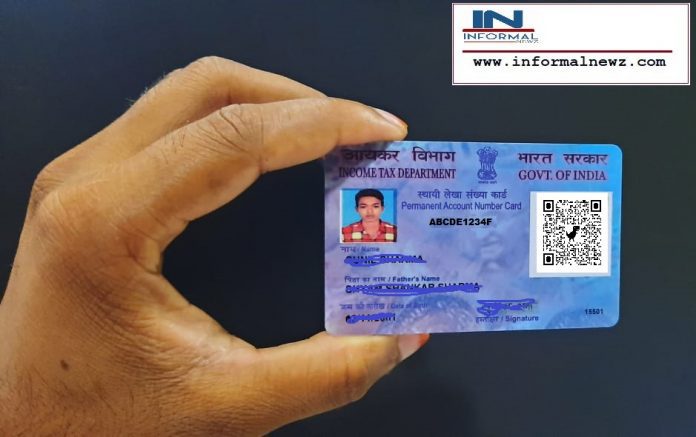PAN card number is mandatory for carrying out several financial transactions. In case you do not hold PAN card, you will have to sign Form 60 declaration
- Not just for filing of income tax returns (ITR), PAN card is also mandatory for carrying out several transactions
- You can also use your Aadhaar card number in lieu of PAN card number or sign Form 60
- NRIs get relaxation in quoting PANs in some cases
New Delhi: Permanent Account Number or PAN is one of the most important financial documents in the country. PAN is a ten-digit unique alphanumeric number issued by the Income Tax Department. It enables the tax department to link all transactions of the assessee with the department.
These transactions include tax payments, TDS/TCS credits, returns of income, specified transactions, correspondence etc. PAN facilitates easy retrieval of information of assessee and matching of various investments, borrowings and other business activities of assessee to ensure there is no tax evasion or suspicious transactions.
Specified financial transactions in which quoting of PAN is mandatory:
The Income Tax Department has said that as per rule 114B of the Income Tax Act, there are some transactions in which quoting of PAN is mandatory by every person except the Central Government, the State Governments and the Consular Offices. These transactions are:
- Sale or purchase of a motor vehicle or vehicle other than two-wheeled vehicles.
- Opening an account with a banking company or a co-operative bank.
- Making an application for issue of a credit or debit card.
- Opening of a demat account with a depository, participant, custodian of securities or any other person with SEBI.
- Payment in cash of an amount exceeding Rs. 50,000 to a hotel or restaurant against bill at any one time.
- Payment in cash of an amount exceeding Rs. 50,000 in connection with travel to any foreign country or payment for purchase of any foreign currency at any one time.
- Payment of an amount exceeding Rs. 50,000 to a Mutual Fund for purchase of its units.
- Payment of an amount exceeding Rs. 50,000 to a company or an institution for acquiring debentures or bonds issued by it.
- Payment of an amount exceeding Rs. 50,000 to the Reserve Bank of India for acquiring bonds issued by it.
- Deposit with a banking company or a co-operative bank:- Cash exceeding Rs. 50,000 during any one day; or Cash deposit of aggregating to more than Rs. 2,50,000 during the period 09th November, 2016 to 30th December, 2016.
- Payment in cash for an amount exceeding Rs. 50,000 during any one day for purchase of bank drafts or pay orders or banker’s cheques from a banking company or a co-operative bank.
- A time deposit of amount exceeding Rs. 50,000 or aggregating to more than Rs. 5 lakh during a financial year with – a banking company or a co-operative bank; a Post Office; a Nidhi referred to in section 406 of the Companies Act, 2013 or a non-banking financial company.
- Payment in cash or by way of a bank draft or pay order or banker’s cheque of an amount aggregating to more than Rs. 50,000 in a financial year. for one or more pre-paid payment instruments, as defined in the policy guidelines for issuance and operation of pre-paid payment instruments issued by Reserve Bank of India under section 18 of the Payment and Settlement Systems Act, 2007 to a banking company or a co-operative bank or to any other company or institution.
- Payment of an amount aggregating to more than Rs. 50,000 in a financial year as life insurance premium to an insurer.
- A contract for sale or purchase of securities (other than shares) for amount exceeding Rs. 1 lakh per transaction.
- Sale or purchase, by any person, of shares of a company not listed in a recognised stock exchange for amount exceeding Rs. 1 lakh per transaction.
- Sale or purchase of any immovable property for an amount exceeding Rs. 10 lakh or valued by stamp valuation authority referred to in section 50C of the Act at an amount exceeding ten lakh rupees.
- Sale or purchase of goods or services of any nature other than those specified above for an amount exceeding Rs. 2 lakh per transaction.
Remember that quoting of PAN is not required by a non-resident in a transaction referred at point No. 3 or 5 or 6 or 9 or 11 or 13 or 18.
It is worth adding that minors can quote PAN of their father or mother or guardian provided they do not have any income chargeable to income-tax. Any person, who does not have PAN and enters into any of the transactions listed above, can make a declaration in Form No. 60 to avoid notice or enquiry from the Tax Department.
Aadhaar card rule in lieu of PAN:
The Aadhaar card rule is now another exception but valid only for those who have been allotted a PAN. For example, if the PAN card number is not readily available before you or you have misplaced it, you can easily quote your Aadhaar card number instead of PAN.
The income tax department has allowed all PAN card holders to mention Aadhaar number in lieu of PAN. You can use it not only for filing your income tax returns but also for carrying out the above specified transactions for which PAN is mandatory. But you must link PAN card with Aadhaar card.


